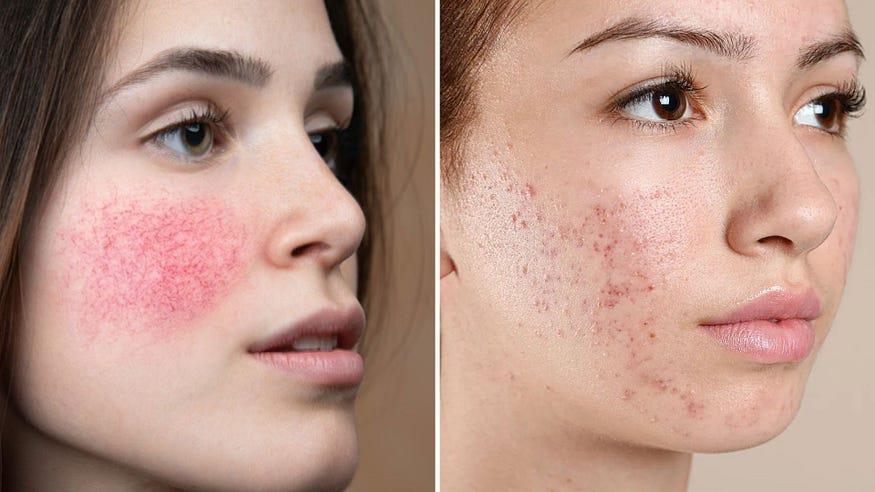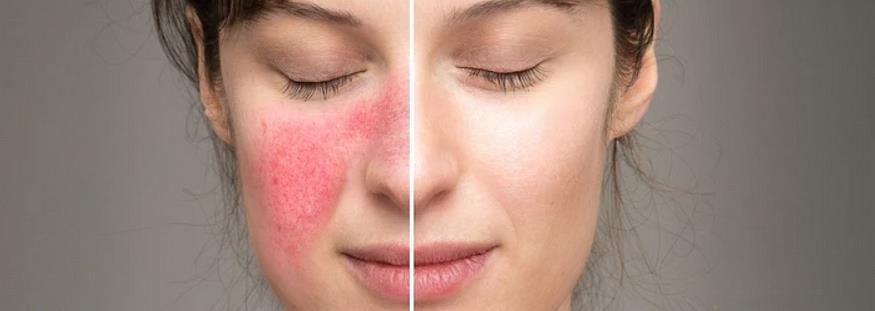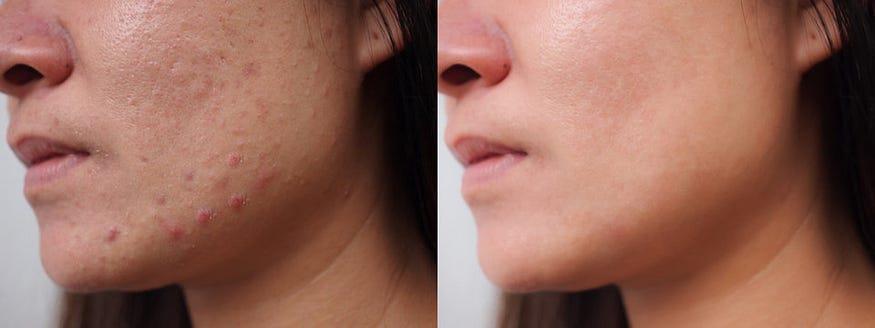Rosacea vs. Acne:
Key Differences and How to Treat Each
Understanding thedifferencesbetween rosaceaand acne iscrucial for effectivetreatment and management. Both conditions can lead to facial redness, breakouts, and increased sensitivity,buttheyhavedistinctcharacteristics,causes,andtreatmentoptions.Thisarticle explores the key differences between rosacea and acne, along with effective treatment strategiesforeachcondition.

Key Differences Between Rosacea and Acne
1. Symptoms and Appearance
● Rosaceaischaracterizedbypersistentfacialredness,visiblebloodvessels,andacnelike breakouts that do not include blackheads. The redness is often widespread, affecting the central face (cheeks, nose, forehead, and chin) and may also lead to thickeningoftheskinorrhinophyma(enlargementofthenose)inseverecases.
● Acne,ontheotherhand,presentsinvariousformssuchasblackheads,whiteheads, papules,pustules,andcysts.Acnecanoccuronmultipleareasofthebodyincluding
thebackandshoulders,whilerosaceaisprimarilylocalizedtotheface.Theredness associatedwithacneistypicallylimitedtotheareasurroundingindividualpimples.
2. Triggers
● Rosacea can be triggered by external factors such as sun exposure, spicy foods, alcoholconsumption,stress,andextremetemperatures.Identifyingthesetriggersis essentialformanagingflare-ups.
● Acneisofteninfluencedbyinternalfactorsincludinghormonalchanges,increasedoil productionintheskin,andbacterialgrowth.Whiledietmayplayaroleinsomecases, itislessdefinitivecomparedtorosacea.
3. Age of Onset
● Rosacea commonly affects adults aged 30 to 50 years old and tends to be more prevalentinindividualswithfairskin.
● Acne primarily affects teenagers due to hormonal changes during puberty but can persistintoadulthoodorevenstartlaterinlife.
Treatment Options
Rosacea Treatment
Managingrosaceainvolvesacombinationoflifestylemodificationsandmedicaltreatments:
● Topical Medications: Creams containing metronidazole or azelaic acid can help reduceinflammationandrednessassociatedwithrosacea.
● Oral Antibiotics: Theseareoftenprescribedfortheiranti-inflammatoryproperties tohelpcontrolsymptoms.
● Laser Treatments: Lasertherapiesareahighlyeffectiveoptionforreducingvisible blood vessels and overall redness. In cities like Toronto, specialized clinics offer Rosacea Laser Treatment Toronto,whichtargetsspecificsymptomseffectively.
● Lifestyle Changes: Patientsareadvisedtoavoidknowntriggerssuchashotdrinks, spicyfoods,andsunexposurewhileusinggentleskincareproducts.

Acne Treatment
Acne treatment focuses on reducing oil production, preventing clogged pores, and addressingbacterialgrowth:
● Topical Treatments: Over-the-counter options like benzoyl peroxide or salicylic acid can unclog poresand reduceinflammation. Prescription retinoidsmay also be recommendedformoreseverecases.
● Oral Medications: Hormonal treatments such as oral contraceptives can help regulatehormonesthattriggeracneinwomen.Isotretinoinisapowerfuloptionfor severecasesthatdonotrespondtoothertreatments.
● Laser Therapy: Similartorosaceatreatment,lasertherapy can alsobeutilizedfor acne management to reduce oil production and improve skin texture. Clinics in Toronto provide comprehensive solutions including Laser Treatment Toronto, whichcanbetailoredtoindividualneeds.
● Chemical Peels & Microdermabrasion: Theseprocedureshelp removedead skin cellsandclearcloggedporeseffectively.


